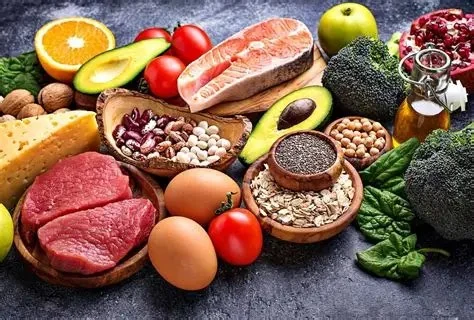
- Introduction to Nutrition
- The Essential Nutrients
- Understanding Calories and Macronutrients
- How to Build a Balanced Diet
- Common Mistakes in Nutrition
Introduction to Nutrition
Nutrition is the foundation of good health, and understanding the basics is essential for anyone starting their wellness journey. Whether you're a fitness enthusiast or just looking to live a healthier lifestyle, having a solid understanding of nutrition is crucial. In this guide, we will break down the fundamentals of nutrition and provide simple, actionable steps for building a healthier diet.
In simple terms, nutrition refers to the process of providing the body with the right food and nutrients it needs to function optimally. With so much information available, it can be overwhelming to know where to start. Let’s dive into the core components of nutrition that every beginner should understand.

Jennifer Brilliant Yoga / jennifer brilliant
732A Carroll St, Brooklyn, NY 11215, USA
The Essential Nutrients
To build a healthy and balanced diet, you must first understand the basic nutrients your body needs. These nutrients can be divided into two categories: macronutrients and micronutrients.

HomePL8 Softball Training / homepl8
GibsoniaAllegheny CountyPennsylvania
4930 S Pioneer Rd, Gibsonia, PA 15044, USA
1. Macronutrients
Macronutrients are the nutrients that provide the energy your body needs to function. They include:
- Proteins: Essential for building and repairing tissues, proteins are vital for muscle growth and immune function. Good sources of protein include lean meats, fish, eggs, beans, and nuts.
- Carbohydrates: Your body's primary energy source, carbs are found in foods like fruits, vegetables, whole grains, and legumes. They provide the fuel needed for both physical and mental activities.
- Fats: Healthy fats are important for brain health, hormone production, and energy storage. Sources of healthy fats include avocados, olive oil, nuts, and fatty fish like salmon.
2. Micronutrients
Micronutrients, including vitamins and minerals, are essential for various bodily functions, although they do not provide energy directly. These nutrients support immune function, bone health, and many other critical processes. Examples include:
- Vitamins: Such as Vitamin C (immune support), Vitamin A (vision and skin health), and Vitamin D (bone health).
- Minerals: Examples include calcium (bone health), potassium (muscle function), and iron (oxygen transport).
Understanding Calories and Macronutrients
When talking about nutrition, you’ll often hear about calories, which represent the energy value in food. Understanding how calories work, as well as how they relate to macronutrients, is key to making healthier choices.
1. The Role of Calories
Calories are the energy your body needs to perform all its activities, from basic functions like breathing to more intense tasks like exercising. Every person requires a specific number of calories based on their age, activity level, and health goals. The goal is to maintain a healthy balance between the calories you consume and the calories you burn.
2. The Importance of Macronutrient Ratios
How you balance your macronutrients (proteins, carbohydrates, and fats) can impact your health and fitness goals. For example, if you’re trying to build muscle, you may focus on a higher protein intake, whereas a person looking to lose weight might focus on a lower carbohydrate intake. Understanding these ratios can help you build a diet plan that suits your specific needs.
How to Build a Balanced Diet
Building a balanced diet doesn’t mean restricting yourself or following extreme rules. Instead, it’s about making better food choices that nourish your body and fuel your day. Here’s how you can do that:
1. Include a Variety of Foods
A balanced diet consists of a wide variety of foods from all food groups: fruits, vegetables, grains, proteins, and healthy fats. Each food group provides essential nutrients that the body needs to function properly.
2. Focus on Whole Foods
Whole foods, such as fresh fruits, vegetables, whole grains, lean proteins, and healthy fats, are nutrient-dense and provide more vitamins, minerals, and fiber. Try to limit processed foods, which can be high in added sugars, unhealthy fats, and sodium.
3. Control Portion Sizes
Learning about portion sizes can help you maintain a balanced diet and avoid overeating. Understanding how much of each food group you need at each meal will help you stay on track with your nutritional goals.
Common Mistakes in Nutrition
When starting on your nutrition journey, it’s easy to make mistakes that can hinder progress. Here are some common nutrition pitfalls and how to avoid them:
1. Overlooking Hydration
Water is essential for every cell in your body, but it’s often neglected. Many people focus solely on food and forget the importance of drinking enough water. Aim to drink at least eight glasses a day, more if you’re active or in hot weather.
2. Skipping Meals
While it might seem like a good way to reduce calories, skipping meals can slow down your metabolism and lead to overeating later in the day. Instead, try eating smaller meals throughout the day to maintain your energy levels and avoid binge eating.
3. Focusing Only on Weight Loss
Many people get caught up in dieting to lose weight, but it’s important to focus on overall health rather than just weight loss. A balanced diet should include foods that nourish your body, support your immune system, and help you feel good.
For more tips and personalized guidance on your nutrition journey, check out Hot Fitness, where we offer a range of resources to help you make informed, healthy choices in your daily diet.







 The Iron Forge Gym5.0 (16 reviews)
The Iron Forge Gym5.0 (16 reviews) Club Pilates4.0 (120 reviews)
Club Pilates4.0 (120 reviews) Nourishing Storm Yoga Studio5.0 (26 reviews)
Nourishing Storm Yoga Studio5.0 (26 reviews) Eunmi's Sound Healing & Yoga5.0 (97 reviews)
Eunmi's Sound Healing & Yoga5.0 (97 reviews) Revolution Yoga5.0 (20 reviews)
Revolution Yoga5.0 (20 reviews) Fit Body Boot Camp Chinatown5.0 (25 reviews)
Fit Body Boot Camp Chinatown5.0 (25 reviews) How to Stay Motivated in Your Cardio Routine: Tips and Tricks
How to Stay Motivated in Your Cardio Routine: Tips and Tricks How to Do Weight Loss Safely and Effectively
How to Do Weight Loss Safely and Effectively How to Stay Motivated in Your Pilates Journey – Expert Tips for 2025
How to Stay Motivated in Your Pilates Journey – Expert Tips for 2025 How to Build a Sustainable Running Routine That Survives Shorter Fall Days and Busy Schedules
How to Build a Sustainable Running Routine That Survives Shorter Fall Days and Busy Schedules How to Stay Motivated in Your HIIT Workouts>
How to Stay Motivated in Your HIIT Workouts> How to Use Progressive Overload Safely With Bodyweight Exercises This Autumn
How to Use Progressive Overload Safely With Bodyweight Exercises This Autumn